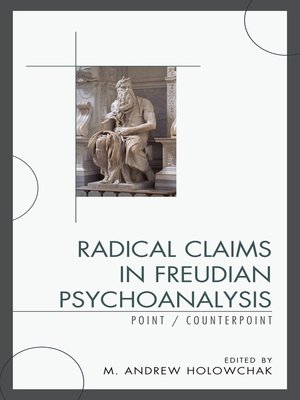
Sign up to save your library
With an OverDrive account, you can save your favorite libraries for at-a-glance information about availability. Find out more about OverDrive accounts.
Find this title in Libby, the library reading app by OverDrive.



Search for a digital library with this title
Title found at these libraries:
| Library Name | Distance |
|---|---|
| Loading... |
Radical Claims in Freudian Psychoanalysis: Point/Counterpoint, edited by M. Andrew Holowchak, features pro and con essays on some of the most extreme Freudian claims, including the Freudian unconscious and the Oedipus complex. Holowchak collects the writings of critical scholars in the fields of psychology and philosophy who have distinguished themselves in the area through prior publications.
This edited collection comprises six parts that address the topics—the Oedipus complex, dreams and wish-fulfillment, religion as an illusion, free association, the Freudian unconscious, and Freudian psychoanalysis as a Weltanschauung—in pro/con essay format. The format of this volume allows for a close examination of contentious issues from more than one viewpoint so as to enable readers to see that there are (often wide) differences of opinion on contentious issues, thereby allowing for a broader perspective for critical engagement. Moreover, by addressing some of the most radical claims of Freud's psychoanalysis, this collection is proof that even many radical Freudian claims are still taken very seriously by prominent scholars.
This edited collection comprises six parts that address the topics—the Oedipus complex, dreams and wish-fulfillment, religion as an illusion, free association, the Freudian unconscious, and Freudian psychoanalysis as a Weltanschauung—in pro/con essay format. The format of this volume allows for a close examination of contentious issues from more than one viewpoint so as to enable readers to see that there are (often wide) differences of opinion on contentious issues, thereby allowing for a broader perspective for critical engagement. Moreover, by addressing some of the most radical claims of Freud's psychoanalysis, this collection is proof that even many radical Freudian claims are still taken very seriously by prominent scholars.







